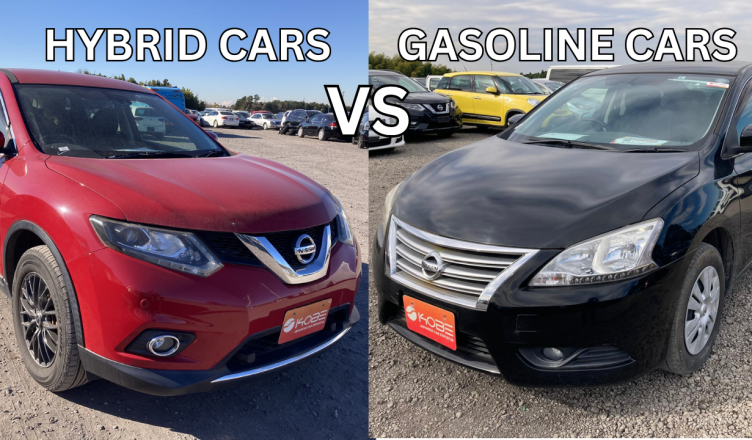The image above shows a 2017 Nissan X-Trail Hybrid and a 2019 Nissan Sylphy.
🚘 What’s the Difference?
- Hybrid cars combine a gasoline engine with an electric motor and battery. The electric motor helps during low-speed driving, while the gas engine takes over when more power is needed.
- Gasoline (ICE) cars rely purely on an internal combustion engine powered by petrol or diesel.
🍃 Pros & Cons: Hybrid Cars
Pros:
- Better Fuel Efficiency
Hybrids can switch to electric power in slow traffic, saving a lot on fuel. - Lower Emissions
They burn less gasoline, which means fewer tailpipe pollutants. - Quiet & Smooth Driving
The electric motor gives a smoother, quieter ride, especially in city driving.
Cons:
- Higher Upfront Cost
Hybrids usually cost more than gasoline cars due to their more complex powertrains. - Complex Maintenance
Dual systems (engine + motor) mean parts and repairs are more specialized and could be more expensive. - Limited Electric Range
Most hybrids can only drive a short distance purely on electric power before the gas engine kicks in.
🔧 Pros & Cons: Gasoline Cars
Pros:
- Lower Initial Price
Gas-powered cars are generally cheaper to buy since they don’t have the extra electric system. - Easy to Refuel
Fuel stations are everywhere, and you can fill up quickly no waiting for charging. - Simplicity & Repair Access
Mechanics for ICE vehicles are much more common, making repairs generally more accessible.
Cons:
- Lower Fuel Efficiency
Gas cars typically use more fuel, especially in city driving. - Higher Emissions
Since they burn more fuel, they release more CO₂ and other pollutants. - More Wear on Brakes
Without regenerative braking, brake pads wear out faster, increasing maintenance cost.
💸 Cost: Long-Term vs Short-Term
- Short-Term: You pay more upfront for a hybrid.
- Long-Term: You may save on fuel and possibly maintenance, especially in city driving with a lot of stop-and-go.
- Break-even question: If you don’t drive a lot, the fuel savings might not offset the higher purchase cost. Some studies even suggest hybrids may not be a good financial deal in certain cases.
🧭 Which Is Right for You?
Choose a hybrid car if you:
- Drive mostly in the city
- Want to save on fuel and emissions
- Can handle a higher purchase cost
Choose a gasoline car if you:
- Want lower upfront costs
- Drive long distances regularly
- Prioritize simplicity and easy repair
Final Thought
Hybrid cars offer a compelling balance: cleaner, more efficient driving, especially in traffic. But gasoline cars still make sense for buyers who want simplicity, lower purchase cost, or who don’t drive enough to recoup that premium.

